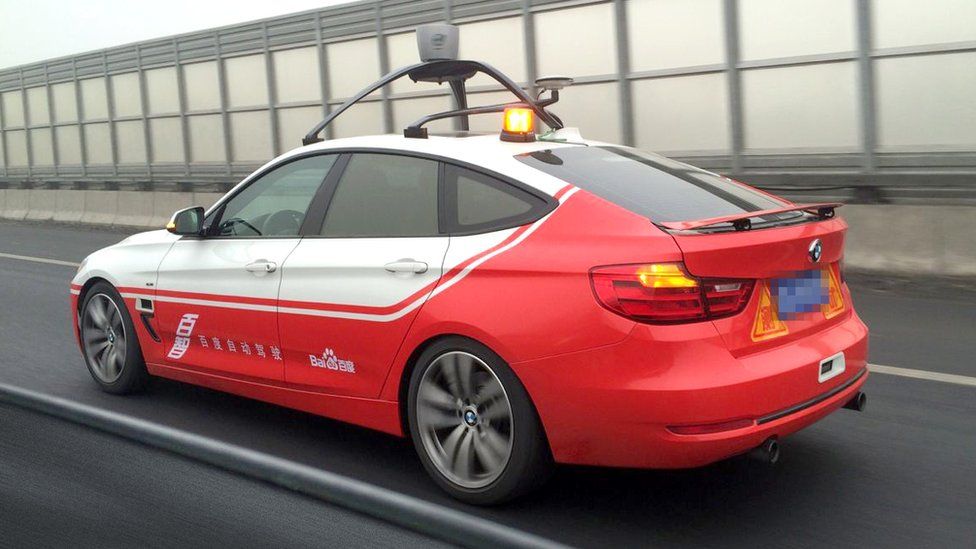Baidu to share self-drive car technology
- Published

Chinese internet giant Baidu has said it will share much of the technology it has created for its self-driving cars.
The firm predicted that the move would help drive the development of autonomous vehicles.
Called Apollo, the project will make a range of software, hardware and data services available to others, especially carmakers.
Other firms in the sector, such as Tesla and Google, have tended to keep key developments secret.
'Greater innovation'
Baidu, often described as China's Google, has been developing self-drive vehicles since 2015.
Making the announcement ahead of the Shanghai Auto Show, it said technologies for use in restricted test environments would be available as soon July.
There will then be a gradual roll-out of other technology, with an aim to offer its full range of developments to support self-driving for highways and city roads by 2020.
In a statement, Baidu's group president Qi Lu said it wanted to create a "collaborative ecosystem" using its strengths in artificial intelligence (AI) to "encourage greater innovation and opportunities, making better use of our technology to drive the evolution of the entire industry".
What's in it for Baidu?
This move could be likened to Google's decision to release Android, the free operating system for smartphones, says James Chao of IHS Markit.
Even though it was free to use, it became a success for Google because it drives users to the company's various mobile apps and services.
By becoming the supplier of the "brains" for more cars than just the ones it makes itself, there are clear benefits. One is potential revenue from carmakers in the long term.
And what is also crucial to the development of self-driving vehicles is data. The more cars using its technology, the more data it should be able to harvest.
"It really sounds like they want to treat this like a smartphone platform," Mr Chao said. "The holy grail for software in cars is to become the Android or iOS that everyone is using, and this is their strategy to do that."
Who is likely to want to use this tech?
Baidu's statement alludes to opportunities in the US, but also in its home market.
"China is the world's largest market for automotive sales and production. It has many car brands and an open environment that is ripe for collaboration," group president Qi Lu said.
Analyst Mr Chao agrees. "I can think of at least 20 Chinese carmakers who would be perfect candidates," he told the BBC.
"They don't have huge research budgets or the resources to figure out how to make self-driving vehicles themselves.
"These are firms that tend to rely on suppliers so they can build a car and so this fits in perfectly for them."
He said this could mean that Baidu's technology will be used in millions of cars on China's roads by 2020.
However, bigger international carmakers who are already working on autonomous vehicles are unlikely to follow suit.
How advanced is Baidu's driverless car technology?
Motivated by the widespread pollution problems, Beijing has pushed for more electric vehicles and Chinese carmakers have responded significantly.
And in the race for driverless car technology, Chinese companies are taking big strides. Along with Changan and Geely, Baidu is one of the big players, with AI research being done in both China and Silicon Valley.
But it is not clear how the software and hardware Baidu has developed compares with that of its rivals. Some analysts say it has done less testing, and therefore has less data to work with, than Google and Tesla.
- Published28 April 2016
- Published5 January 2017
- Published16 May 2016